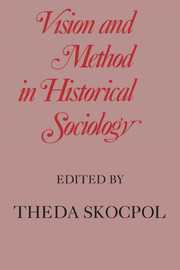Book contents
- Frontmatter
- Contents
- Preface
- 1 Sociology's Historical Imagination
- 2 The Social and Historical Landscape of Marc Bloch
- 3 Beyond the Economistic Fallacy: The Holistic Social Science of Karl Polanyi
- 4 Configurations in History: The Historical Sociology of S. N. Eisenstadt
- 5 Theoretical Generalization and Historical Particularity in the Comparative Sociology of Reinhard Bendix
- 6 Destined Pathways: The Historical Sociology of Perry Anderson
- 7 E. P. Thompson: Understanding the Process of History
- 8 Charles Tilly's Collective Action
- 9 The World System of Immanuel Wallerstein: Sociology and Politics as History
- 10 Discovering Facts and Values: The Historical Sociology of Barrington Moore
- 11 Emerging Agendas and Recurrent Strategies in Historical Sociology
- An Annotated Bibliography on Methods of Comparative and Historical Sociology
- Notes on the Contributors
6 - Destined Pathways: The Historical Sociology of Perry Anderson
Published online by Cambridge University Press: 05 June 2012
- Frontmatter
- Contents
- Preface
- 1 Sociology's Historical Imagination
- 2 The Social and Historical Landscape of Marc Bloch
- 3 Beyond the Economistic Fallacy: The Holistic Social Science of Karl Polanyi
- 4 Configurations in History: The Historical Sociology of S. N. Eisenstadt
- 5 Theoretical Generalization and Historical Particularity in the Comparative Sociology of Reinhard Bendix
- 6 Destined Pathways: The Historical Sociology of Perry Anderson
- 7 E. P. Thompson: Understanding the Process of History
- 8 Charles Tilly's Collective Action
- 9 The World System of Immanuel Wallerstein: Sociology and Politics as History
- 10 Discovering Facts and Values: The Historical Sociology of Barrington Moore
- 11 Emerging Agendas and Recurrent Strategies in Historical Sociology
- An Annotated Bibliography on Methods of Comparative and Historical Sociology
- Notes on the Contributors
Summary
The publication in 1974 of Perry Anderson's Passages from Antiquity to Feudalism and Lineages of the Absolutist State made quite a splash, sending ripples of appreciation through intellectual circles in Great Britain, the United States, and beyond. Conceived in the grand tradition of classical social science and written in open dialogue with the ideas of Max Weber and Karl Marx, Anderson's two books offer a single, coherent overview of European civilization from the ancient sway of Greece and Rome through the last days of absolutist monarchies in early modern Europe. “A complex, beautifully interwoven and controlled” account, said Moses Finley in the Guardian, and Keith Thomas, reviewing Passages-Lineages for the New York Review of Books, seconded this enthusiasm: “The breath-taking range of conception and architectural skill with which it has been executed make [this] work a formidable intellectual achievement.” Tariq Ali called Passages-Lineages a “Marxist masterpiece.” Even D. G. MacRae, normally hostile to Marxist arguments, declared that these “two books are enormously pleasurable,” and called them a “major contribution” to historical sociology.
Anderson's books are not only brilliantly executed and intrinsically fascinating, they are also of unusual theoretical and methodological interest in a number of ways. For Marxists, perhaps their chief interest lies in Anderson's attempt to highlight the specifically political aspects of long-run social change.
- Type
- Chapter
- Information
- Vision and Method in Historical Sociology , pp. 170 - 210Publisher: Cambridge University PressPrint publication year: 1984
- 6
- Cited by

